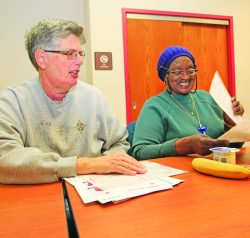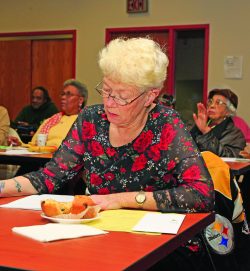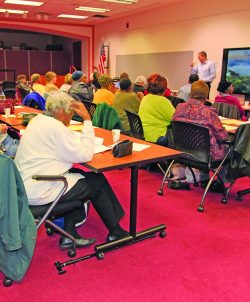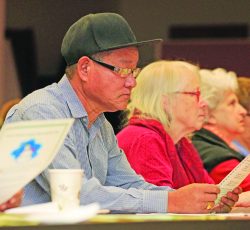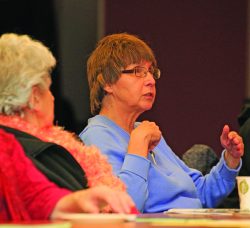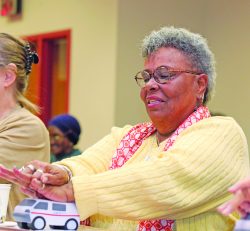It’s fairly well known that Allegheny County has one of the highest concentrations of older adults in the entire county. A 2014 report (“The State of Aging in Allegheny County”) showed that approximately 34 percent of older adults in the county live alone. It also found that approximately half of individuals age 75 and older live alone, and that 42 percent of those needing assistance with routine and personal care needs are more likely to be living alone.
Living alone can lead to various risk factors for older adults, including feelings of isolation and loneliness that may negatively impact one’s physical and mental health. Social connectedness, on the other hand, has been proven to lead to better health outcomes, including survival after heart attacks, slower memory decline, less risk of cancer recurrence and more resistance to the common cold. The good news is that the Senior Companion Program of Allegheny County—among many other programs offered by the Department of Human Services Area Agency on Aging—can help to alleviate these risk factors and increase social connectedness.
The Senior Companion Program is a federally funded program in which older adult volunteers age 55 and older provide friendly visits once or twice a week to seniors who could benefit from such visits. Seniors receiving visits typically require some extra assistance to remain living independently at home. While some of these seniors have medical issues, others are simply lonely or isolated, or lacking in family or social supports. Having visits from Senior Companions helps to brighten their days and lift their spirits.
Senior Companion visits are typically three to four hours, and they occur during daylight hours, Monday to Friday. There are no weekend or evening visits. The Senior Companions receive a small stipend for their service, but there is no cost to the care recipients. Typical Senior Companion activities include conversing, playing cards or games, participating in hobbies, help with sorting through mail, preparing light meals, or watching a favorite show together. It’s important to note that Senior Companions do not provide housekeeping or direct care assistance such as bathing, dressing or administering medications.
All Senior Companions are thoroughly screened through a three-part background check process, including checking the public sex offender registry, a Pennsylvania state police check, and an FBI check that includes fingerprinting. They also complete 20 hours of pre-service orientation and attend monthly in-service trainings to stay informed about issues related to working with older adults.
How the Program Benefits Participants
Program participants receive many benefits, including increased socialization, decreased loneliness and a friend they can count on. A recent survey of program participants found that as a result of the program, care recipients feel less lonely, are able to do more of the thing they need to do, can remain living in their own homes, are eating regularly scheduled meals, and are more satisfied with their lives.
“My Senior Companion is more than a companion; he’s my friend,” says one participant. “Talking to him about life experiences makes me feel better. He reads with me, plays board games, talks to me, and we do crossword puzzles together. Life is so much better since I have him.”
The program also helps older adults manage their daily affairs and function better at home. “My Senior Companion has helped me a lot,” comments another participant. “She helped me to receive a cell phone, a rent rebate, and all kinds of other help with county programs. And she helps with all my doctors’ appointments. I would be lost without her!”
Yet another participant had this to say: “I get to go out with my Senior Companion and use the exercise equipment at the senior center. I feel very comfortable with her and we truly enjoy each other’s company.” The program is about easing loneliness and making social connections, many of which last for several years. “I look forward to my visits with my Senior Companion. She is very pleasant and easy to get along with. We enjoy each other’s company, and when she leaves, I can’t wait to see her the next week,” says another participant.
How the Program Benefits Family Caregivers
Aside from the older adults themselves, regular visits from a Senior Companion can also prove invaluable to family caregivers, who often find themselves stressed and burned out from their caregiving responsibilities. Having a trusted volunteer come once or twice a week allows the caregiver time for a much-needed break to take care of his or her own needs. “The respite for me as a caregiver has been wonderful,” says one of the participant’s caregivers. “Knowing that Mom has someone so friendly and kind to interact with brightens her day and mine. It’s given me peace of mind to take my ‘Thursday break’ to do things I want to do, take care of my needs, or just rest.”
Another caregiver added: “The program has been a blessing for me. I have comfort in our Companion. I’m not worried when I leave home. It has given me time to do the things that need tended to, and to spend time doing something fun like a movie or lunch with a friend without the stress. I am so grateful for her and the help.”
Having the Senior Companion in place can help alleviate the stress and ease the burden on family caregivers. “She takes a genuine interest in us and in our family. Her respectful, lighthearted, and compassionate conversation meets my mom’s need for companionship,” comments another caregiver about her experience with the program.
The Program Benefits its Volunteers, too
Research shows that volunteering is a rewarding activity that has numerous benefits derived from helping others, and Senior Companions are the first to acknowledge this. “I find that giving time to people who are homebound is rewarding for both myself and them,” says one Senior Companion. “It gets me out of the house, and keeps me moving and exercising for my health.”
“Being a Senior Companion is a sort of therapy for me because it gets me moving and active, and gives me a purpose for tomorrow,” says another volunteer. “The older adults that I visit make me smile! They always tell great stories.”
The program also provides tangible benefits to its volunteers, including:
• Tax-free stipend of $2.65 per hour, paid every two weeks
• Travel reimbursement to cover the cost of travel
• Meal allowance to cover lunch cost while in volunteer service
• Liability insurance
• Ongoing professional supervision
• Free monthly training on a variety of topics relating to older adults
Senior Companions must meet certain income guidelines, such that the volunteer’s income should not exceed 200 percent of the federal poverty line.
Recruiting Volunteers in “Hard to Serve” Areas
The Senior Companion program currently has 100 active volunteers and is always looking for compassionate people to join its ranks. A current challenge for the program, according to program manager John Miller, is finding volunteers in certain parts of the county. “We have wonderful volunteers who do a great job,” John says. “My goal right now is to have volunteers in all parts of Allegheny County so that anyone who requests a volunteer can be connected to one quickly.”
John explains that currently, most volunteers are concentrated in the City of Pittsburgh and the eastern suburbs. “We really need people from the West Hills, South Hills and North Hills. While previous experience working with older adults is helpful, the only requirement to be a Senior Companion is to have a kind, caring personality and genuine interest in helping older adults.
Training Begins in April
The next training for Senior Companion program volunteers is scheduled for April. Consider brightening someone’s day just by giving your time. As another one of the participants shares, “My Senior Companion means more to me than just the time she is here. The day before, I spend the whole day thinking about what we talk about or what I want to show her. She is a lifesaver because it’s so wonderful to have someone to talk with. She is like family.”
To apply for a Senior Companion or to inquire about becoming a Senior Companion, call John Miller at (412) 350-4061.
Areas where Senior Companions are most needed:
West: Imperial, Oakdale, Robinson, Moon, Coraopolis, North Fayette
North: Ross, Reserve, Shaler, Hampton, O’Hara, McCandless, West View
South: Bridgeville, Castle Shannon, Bethel Park, Mt. Lebanon, South Park
By Gina Mazza
For Pittsburgh Senior News
Featured photo: Justine Davis practices the chest compression exercises.
All photos by Chuck LeClaire for Pittsburgh Senior News
